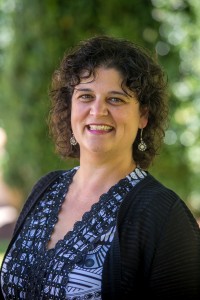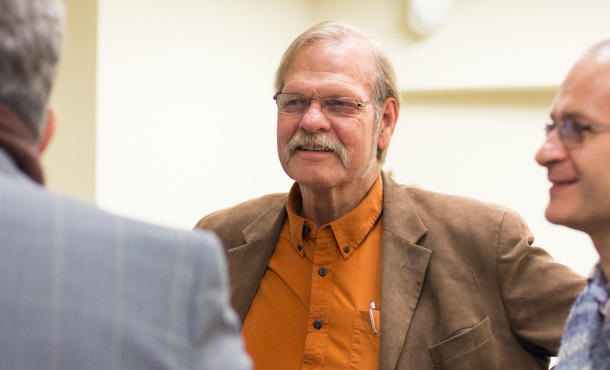Ed Martin’s interest in interfaith work won’t stop when he ends his six-year term as director of Eastern Mennonite University’s Center for Interfaith Engagement. Martin, whose last day is Thursday, plans to continue to promote relationships and networks with scholars and students from Iran and the United States.
He’s also been exploring ideas with associate provost Mary Jensen to promote interfaith engagement at the EMU Lancaster site.
He just won’t be driving nearly 470 miles round-trip from his home in Akron, Pennsylvania, to Harrisonburg, Virginia each week. And there will be a first grandchild in Washington D.C. to spend time with [his daughter is lawyer Shanti Martin Brown ’01.]

Associate director Trina Trotter Nussbaum becomes interim director—the center’s third leader since its inception in 2008.
The center’s activities have included the funding of scholars to teach undergraduate and graduate comparative religion, religion and language courses; hosting of a popular annual lecture or film series; support of the annual Interfaith Peace Camp for area youth; and participation in local interfaith work.
Additionally, CIE helped raise funds to bring Iranian scholars to the Summer Peacebuilding Institute and helped connect the EMU academic community to a series of Mennonite-Shi’a dialogues.
“There’s a real need for this kind of work today,” Martin said, adding that he hopes the center continues to build on local connections to interfaith organizations and denominations of all faiths.
Another vision for the future, he shared, is permanent faculty who could teach Islamic religion and history, and faculty to support an interfaith minor.
Interfaith experience
Martin led the center through a period of stabilization and growth, taking over from first-year director Gerald Shenk, after his wife, Sara, became president of Anabaptist Mennonite Biblical Seminary.
Martin came to EMU from the American Friends Service Committee and a position as the Quaker International Affairs Representative for Iran, building connections between Iranian institutions and the United States, and providing resources for public education and advocacy regarding Iran in United States.
Prior to that appointment, he worked for 18 years with Mennonite Central Committee as director of programs for Central and Southern Asia, as well as the Middle East. Early in his career, he worked at the International Irrigation Management Institute in Sri Lanka.
Each of these previous positions, including extensive travel and a year of studying about Islam at a seminary, exposed him to other religions and to interfaith dialogue.
Foundation for growth
The center, begun in 2008 as a feasibility study by Vernon Jantzi and Gretchen Maust, grew out of decades of Mennonites’ practical experience working across deep religious divides around the world.
The organization’s first name, “Abraham’s Tent: A Center for Interfaith Engagement,” highlights the three world religions that worship one God – Judaism, Christianity and Islam.
Martin’s first task when he assumed the directorship was securing funding—the center is still funded entirely by foundation grants and private donations.
A three-year grant from the Henry Luce Foundation helped bring an interfaith contingent of scholars from fall 2012 through spring 2015. Amir Akrami and his wife Sheida Shakouri Rad, both professors from Tehran, Iran, were joined for a semester by Niles Goldstein, community rabbi and rabbinic scholar for two large Reform Jewish synagogues in Chicago. Akrami, Goldstein and a third Mennonite scholar co-taught a “Comparative Monotheisms” course to two dozen undergraduates, graduate students, seminarians and members of the community.
Additionally, Martin was active in securing funding through the William and Mary Greve Foundation for nine Iranian women, all graduate students from the women’s seminary in Qom, Iran, to attend the Summer Peacebuilding Institute.
Public events have always been a key offering of the center. In spring 2014, 2015 and 2016, visiting Jewish scholar Bob Bersson, an emeritus professor at James Madison University, has offered a popular film series.
Important goals
Martin said the organization will be on firm footing in the coming months, with plans for future events and for organizational strengthening to ensure sustainability. CIE’s niche is an important one, he said, within a university community which values global engagement and peacebuilding.
Nussbaum has been working to strength CIE ties with local interfaith groups, while Rebekah “Bex” Simmerman, a recent graduate of the Center for Justice and Peacebuilding. Simmerman has been leading a local research focus on interfaith and intra-faith networking to address risks of religiously motivated violence, Martin said.
EMU will also welcome a Fulbright scholar from Indonesia next year. Martin says the presence of a female and Sunni scholar from the world’s largest Muslim country will provide a valuable perspective to the campus community.
“I see all of those efforts continuing,” Martin said. “I greatly affirm EMU for having the vision and courage to initiate CIE. In our pluralistic world, it is so important for our students and community to learn about other religions and to learn to know scholars from other faith traditions.”

Farewell Ed. Hope you have a good retirement.
Congratulations, Ed. Well done! In one of your former lives you served with understanding and compassion in supporting Marilyn and I in our seven years in India. I know you will find ways to continue to contribute in your “retirement.”
Ed retirement is not the end. Interfaith is needed now more than ever before. Peace.
It’s been great working with you, Ed. We’ll miss you. All best wishes, Bob